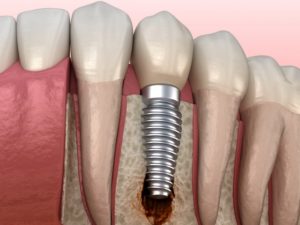
Dental implants are successful in the vast majority of cases. However, dental implant failure does happen occasionally. While you shouldn’t be unduly worried that your new smile will be affected by this issue, you should be aware of what signs might indicate a problem with your implants, and you should know what steps you can take to reduce the risk that it might happen to you. Let’s talk about these important subjects.
Signs of Dental Implant Failure
Dental implant failure can occur at any time after the implants are placed in the jawbone, whether you recently had your surgery or you have been enjoying your new smile for years. Some indications that you should always be on the lookout for include:
- Extreme pain (some pain after implant surgery is normal, but if it is severe or lingers for a long time, there may be a problem)
- Redness and swelling in the gums around an implant
- An implant feels loose
- Gum recession around an implant
- Difficulty chewing
If you suspect that your implants are suffering, you should consult a dental professional as soon as possible. The earlier you seek help, the more likely it is that dental implant salvage will be possible.
Preventing Dental Implant Failure
The old saying is true: an ounce of prevention is worth a pound of cure. You can minimize your risk of dental implant failure by carefully adhering to your dentist’s or oral surgeon’s instructions for caring for your new teeth. Some things you should do include:
- Maintain excellent oral hygiene. The most common cause of implant failure is infection. You can fight harmful bacteria by sticking to a routine that includes thorough brushing and flossing. If you have a dental implant bridge, you may need to use a floss threader to clean beneath it.
- Regularly visit your dentist for preventive care. Your dental team will clean your implants and the area around them, and your dentist will inspect your mouth for any subtle signs of problems.
- Do not smoke. Smoking can interfere with your immune system and wreak havoc on your oral health. It is a leading contributor to dental implant failure.
- Be mindful of what you eat. It is wise to avoid foods with a lot of sugar, as well as extremely hard foods that might damage your implants or their restorations. As a general rule of thumb, you shouldn’t eat any foods that would harm your natural teeth (even if you do not have any natural teeth left).
Do you have dental implants? The above information can reduce the risk of harm to your new teeth and help you enjoy a lifetime of healthy smiles.
Meet the Practice
Drs. Steve L. Koo, Thomas M. Weil, and William D. Shepard are the oral and maxillofacial surgeons at Piney Point Dental Implant Center. They have decades of combined experience. In addition to placing dental implants, they also offer implant salvage services. To learn more about them and how they may be able to help your restored smile stand the test of time, contact our team at 713-597-7340.

